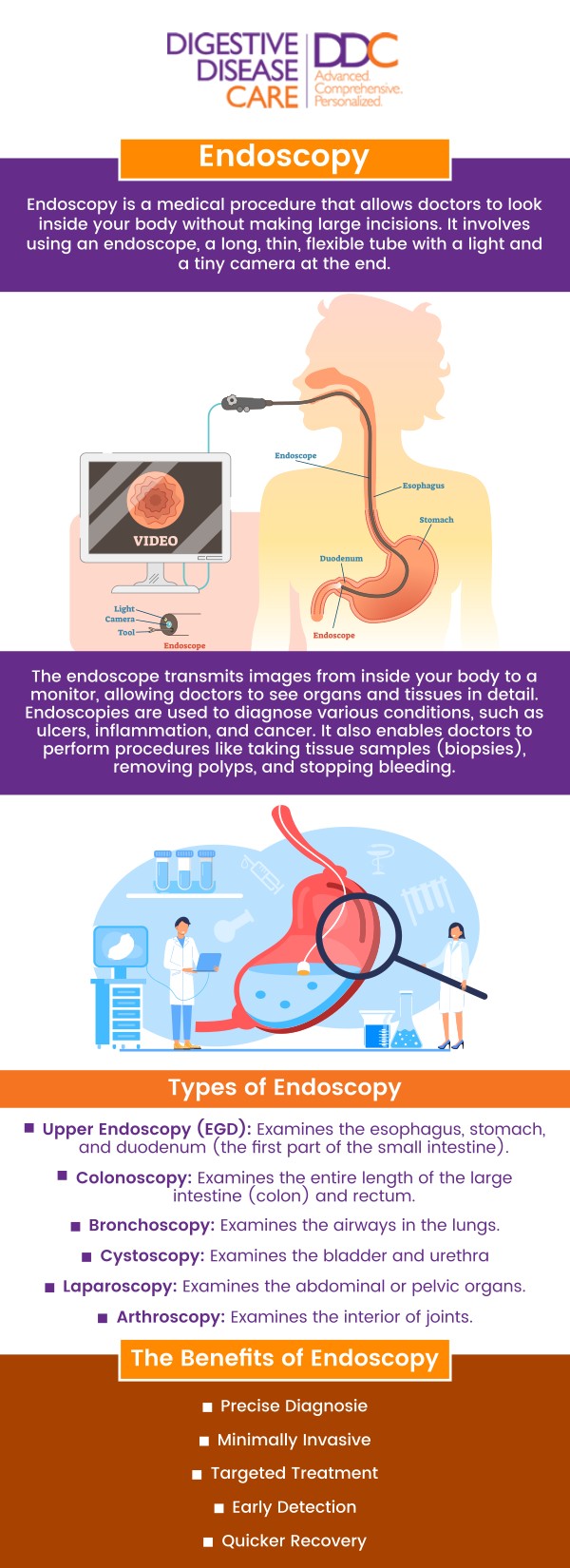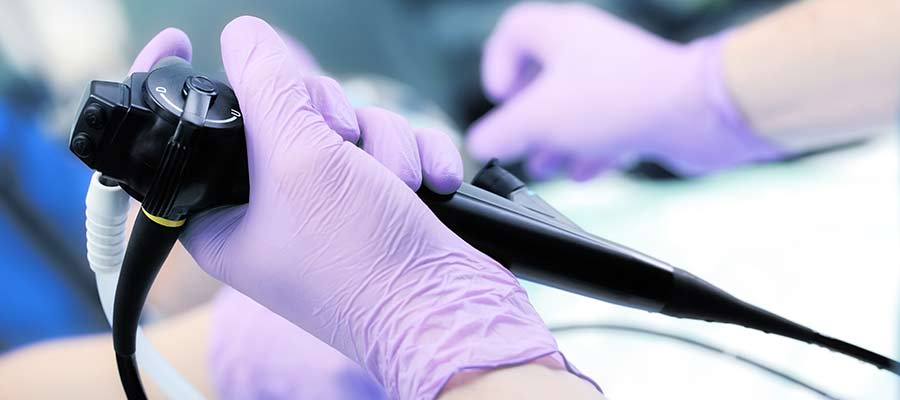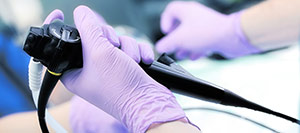Endoscopic Ultrasound Procedure Specialist Q&A
At Digestive Disease Care (DDC), our board-certified gastroenterologists specialize in endoscopic ultrasound procedures for precise diagnosis and treatment of digestive conditions. With advanced technology and expertise, we ensure accurate results and personalized care. Trust DDC for your endoscopic ultrasound needs and comprehensive digestive health care. For more information, contact us or book an appointment online. We have convenient locations to serve you in Babylon NY, East Setauket NY, Forest Hills NY, Jericho NY, Lake Success NY, Melville NY, Mineola NY, Massapequa NY, New Hyde Park NY and Riverhead NY.




Table of Contents:
What does an endoscopic ultrasound do?
What is the difference between endoscopic ultrasound and colonoscopy?
What happens during an endoscopic ultrasound?
How should I prepare for my endoscopic ultrasound?
What is the cost of endoscopic ultrasound?
This minimally invasive procedure allows our doctors to visualize your digestive tract and surrounding organs in detail, aiding in the accurate diagnosis and treatment of numerous digestive conditions.
At Digestive Disease Care, our team uses EUS in a variety of ways to provide optimal patient care. This procedure enables us to closely examine the lining and walls of your esophagus, stomach, gallbladder, and pancreas. We also use EUS for detecting cancers, especially in the esophagus, stomach, pancreas, and bile duct. It is also instrumental in evaluating conditions like chronic pancreatitis and strictures (narrowing) in the digestive tract.
Our advanced EUS technique offers several benefits to our patients. It provides high-quality imaging, which leads to more precise diagnoses. The endoscope used in EUS can get closer to the organs being examined, resulting in clearer, more detailed ultrasound images.
EUS is also less invasive than traditional procedures, providing valuable diagnostic information without the need for open surgery. This translates to less discomfort and a lower risk of complications for our patients. The procedure is typically performed with moderate sedation, ensuring minimal discomfort and quick recovery times.
EUS is mainly used to examine the esophagus, stomach, pancreas, and bile ducts. It employs an advanced endoscope equipped with an ultrasound device to create detailed images of the digestive tract wall and its surrounding tissues and organs. This allows our specialists to accurately diagnose and stage conditions like pancreatic cancer, evaluate tumors or cysts, identify sources of gastrointestinal bleeding, and guide biopsies or therapeutic interventions. EUS is minimally invasive, typically does not require an overnight hospital stay, and offers precise imaging of the digestive tract wall.
Colonoscopy, on the other hand, is primarily utilized to examine the large intestine (colon) and rectum. Our expert gastroenterologists use a colonoscope, a long, flexible tube with a tiny video camera, to investigate the lining of the entire colon. Doctors perform colonoscopies to screen for colorectal cancer and precancerous polyps, diagnose and treat colon and rectal disorders, remove polyps or take biopsies, and investigate unexplained abdominal pain or changes in bowel habits.
The steps involved in performing an EUS include:
• Preparation: Your provider will request that you fast for 6 to 12 hours before your procedure. Once you are situated for the procedure, a sedative will be administered to help you relax, and a local anesthetic may be applied to your throat for added comfort.
• Insertion of Endoscope: To start the procedure, a thin, flexible tube with an ultrasound device is gently inserted through the mouth, navigating through the esophagus, stomach, and duodenum.
• Imaging: The ultrasound emits sound waves to create images of the GI tract and nearby organs like the pancreas, bile ducts, and lymph nodes.
• Examination and Sampling: Real-time images are assessed by a specialist, and tissue samples may be taken if necessary.
• Completion: The endoscope is withdrawn, and you will be monitored by healthcare professionals as the sedative wears off.
EUS is safe, minimally invasive, and offers detailed insights to guide treatment decisions.
Proper preparation for EUS is key to ensuring accurate results and a smooth process. As you prepare, keep in mind the following:
• Share Your Medical History: Talk to your doctor about any medications or supplements you’re taking. Some, like blood thinners, aspirin, or insulin, may need to be paused before your EUS.
• Informed Consent: Prior to the procedure, your provider will ask you to read and sign an informed consent form, which thoroughly explains the risks, benefits, and alternatives. It’s important to thoroughly comprehend everything and ask any questions you may have before signing.
• Fasting and Hydration: You’ll need to fast for 6 to 12 hours before the procedure. This means no food or drinks, but staying hydrated before your fasting period is important. Drink clear fluids like water or broth up until the time you need to stop eating and drinking.
• Additional Preparations: You may need to take a laxative or use an enema if the lower digestive tract needs to be examined. Please wear loose, comfortable clothing to your appointment, and remove any jewelry, including piercings. You will need to organize a ride home with someone you trust, as you will receive sedatives during the procedure. It’s also important to get a good night’s sleep before your visit.
The cost of an endoscopic ultrasound will fluctuate based on factors like your location, the facility you choose, and your insurance coverage. Generally, the procedure usually ranges from $1,750 to $2,500. If you have medical insurance, your plan may cover a portion of the cost of your EUS, but it’s essential to verify with your provider beforehand.
In addition, the type of EUS performed will impact the cost. Diagnostic EUS, typically a simpler procedure, is often less expensive than the more complex interventional EUS. If a condition we’re investigating is more complicated, the process might take longer and require more resources, which can increase the cost.
At Digestive Disease Care, we understand that cost can be a barrier for some. We encourage patients to inquire about financial assistance programs if they are worried about the cost. Schedule your consultation today and embark on a path to better health and well-being. We have convenient locations to serve you in Melville NY, New Hyde Park NY, Forest Hills NY, Jericho NY, Mineola NY, Lake Success NY, Babylon NY, East Setauket NY, Massapequa NY, Riverhead NY and BEYOND.

Check Out Our 5 Star Reviews


Additional Services You May Like

Additional Services You May Like
- Abdominal Pain
- Acid Reflux
- Barretts Esophagus
- Bloating
- Capsule Endoscopy
- Celiac Disease
- Colon Cancer Screening
- Colonoscopy
- Constipation
- Crohns Disease
- Diarrhea
- Diverticulitis
- Esophageal PH Monitoring
- Fatty Liver
- Fibroscan
- Gallstones
- Gastroenterologist
- Gastric Chest Pain
- Gluten Intolerance
- Hemorrhoid
- Hemorrhoid Banding
- Hepatitis
- Irritable Bowel Syndrome
- Lactose Intolerance
- Pancreatitis
- Polyps
- Rectal Bleeding
- Stomach
- Ulcerative Colitis
- GI Urgent Care





